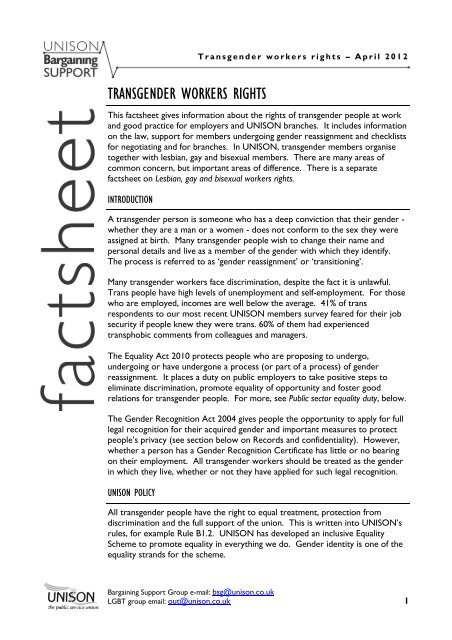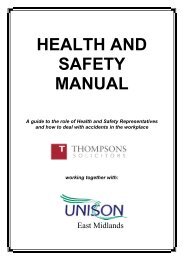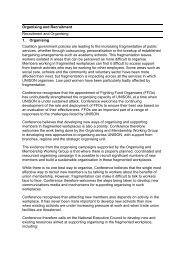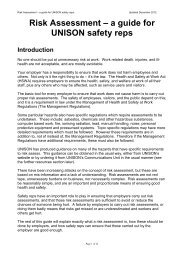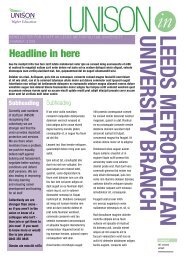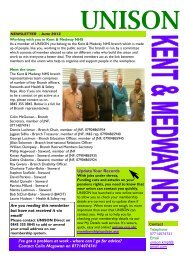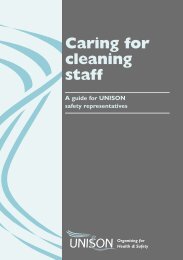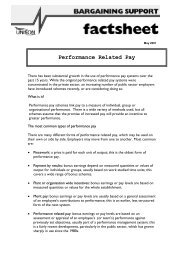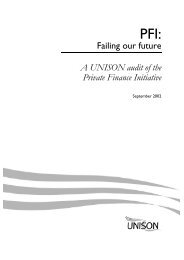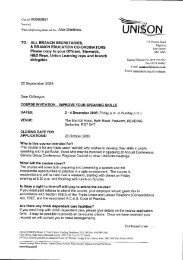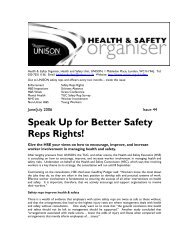TRANSGENDER WORKERS RIGHTS - Unison
TRANSGENDER WORKERS RIGHTS - Unison
TRANSGENDER WORKERS RIGHTS - Unison
Create successful ePaper yourself
Turn your PDF publications into a flip-book with our unique Google optimized e-Paper software.
<strong>TRANSGENDER</strong> <strong>WORKERS</strong> <strong>RIGHTS</strong><br />
T r a n s g e n d e r w o r k e r s r i g h t s – A p r i l 2 0 1 2<br />
This factsheet gives information about the rights of transgender people at work<br />
and good practice for employers and UNISON branches. It includes information<br />
on the law, support for members undergoing gender reassignment and checklists<br />
for negotiating and for branches. In UNISON, transgender members organise<br />
together with lesbian, gay and bisexual members. There are many areas of<br />
common concern, but important areas of difference. There is a separate<br />
factsheet on Lesbian, gay and bisexual workers rights.<br />
INTRODUCTION<br />
A transgender person is someone who has a deep conviction that their gender -<br />
whether they are a man or a women - does not conform to the sex they were<br />
assigned at birth. Many transgender people wish to change their name and<br />
personal details and live as a member of the gender with which they identify.<br />
The process is referred to as ‘gender reassignment’ or ‘transitioning’.<br />
Many transgender workers face discrimination, despite the fact it is unlawful.<br />
Trans people have high levels of unemployment and self-employment. For those<br />
who are employed, incomes are well below the average. 41% of trans<br />
respondents to our most recent UNISON members survey feared for their job<br />
security if people knew they were trans. 60% of them had experienced<br />
transphobic comments from colleagues and managers.<br />
The Equality Act 2010 protects people who are proposing to undergo,<br />
undergoing or have undergone a process (or part of a process) of gender<br />
reassignment. It places a duty on public employers to take positive steps to<br />
eliminate discrimination, promote equality of opportunity and foster good<br />
relations for transgender people. For more, see Public sector equality duty, below.<br />
The Gender Recognition Act 2004 gives people the opportunity to apply for full<br />
legal recognition for their acquired gender and important measures to protect<br />
people’s privacy (see section below on Records and confidentiality). However,<br />
whether a person has a Gender Recognition Certificate has little or no bearing<br />
on their employment. All transgender workers should be treated as the gender<br />
in which they live, whether or not they have applied for such legal recognition.<br />
UNISON POLICY<br />
All transgender people have the right to equal treatment, protection from<br />
discrimination and the full support of the union. This is written into UNISON’s<br />
rules, for example Rule B1.2. UNISON has developed an inclusive Equality<br />
Scheme to promote equality in everything we do. Gender identity is one of the<br />
equality strands for the scheme.<br />
Bargaining Support Group e-mail: bsg@unison.co.uk<br />
LGBT group email: out@unison.co.uk 1
T r a n s g e n d e r w o r k e r s r i g h t s – A p r i l 2 0 1 2<br />
Transgender members have the right not to be discriminated against by<br />
UNISON policies, practices, members or officers. Allegations of discrimination<br />
will be taken very seriously.<br />
Branches need to be aware of trans equality issues and negotiate policies before<br />
one of their members or potential members experiences difficulties. The<br />
Scottish Transgender Alliance and UNISON have produced an introductory<br />
guide for reps, UNISON stock no 2726 – see page 11.<br />
UNISON is affiliated to Press for Change - the political lobbying and educational<br />
organisation campaigning for civil rights and liberties for all trans people (see last<br />
page for contact details).<br />
DEFINITIONS<br />
Gender identity: a person’s internal sense of where they exist in relation to<br />
being male or female.<br />
Transgender or trans person: a person whose own gender identity does not<br />
conform to the sex they were assigned at birth. These are inclusive, umbrella<br />
terms, including people who describe themselves as transsexual, transvestite or<br />
cross dressing people, and people who have a more complex sense of their own<br />
gender than either 100% female or 100% male.<br />
Transsexual person: legal/medical term for someone who lives (or wishes to<br />
live) permanently in the opposite gender to that assigned at birth.<br />
Gender dysphoria: medical diagnosis of a consistent and overwhelming desire<br />
to live in the opposite gender to that assigned at birth.<br />
Gender reassignment: the process of transitioning from the gender assigned<br />
at birth to the gender the person identifies with. This may involve medical and<br />
surgical procedures.<br />
Legal sex: The sex recorded on your birth certificate.<br />
Gender Recognition Certificate: issued by the Gender Recognition Panel –<br />
signifies full legal rights in acquired gender and allows the issuing of a replacement<br />
birth certificate.<br />
SUMMARY OF THE LAW<br />
Gender Recognition Act 2004<br />
The Gender Recognition Act enables people aged over eighteen to gain full legal<br />
recognition for the gender in which they live. Applications are considered by the<br />
Gender Recognition Panel. Once a person receives a Gender Recognition<br />
Certificate (GRC), they are legally of that gender for every purpose and have all<br />
the rights and responsibilities associated with that gender. There is information<br />
about the application process at http://www.grp.gov.uk.<br />
Many trans people do not apply for a GRC. They may not be able to undergo<br />
permanent gender reassignment for health, personal, family, financial or other<br />
reasons. If a person was married before undergoing gender reassignment, they<br />
Working for LGBT equality in UNISON: out@unison.co.uk 2
T r a n s g e n d e r w o r k e r s r i g h t s – A p r i l 2 0 1 2<br />
can’t currently apply for a full GRC without dissolving their marriage, which<br />
many people are not prepared to do. However it is possible to get an interim<br />
certificate, dissolve the marriage and enter a civil partnership with the same<br />
person. Once same sex marriage is introduced, married people will be able to<br />
gain full gender recognition without ending their marriage.<br />
Employment rights do not depend on whether a person has a Gender<br />
Recognition Certificate. Employers should not ask for a person’s GRC and it<br />
should never be a pre-condition for transitioning at work. To make an<br />
application for a GRC, a person needs to show they have been living – and<br />
working - in that gender for at least two years. So being asked to show a GRC<br />
as a condition of changing employment details is like being asked to show a full<br />
driving licence before you can apply for a provisional one.<br />
Equality Act 2010<br />
The Equality Act 2010 protects against discrimination because of gender<br />
reassignment in employment and service delivery. It covers all sizes and types of<br />
employer and all types of worker, including agency, contract and temporary<br />
workers. It bans direct and indirect discrimination and victimisation.<br />
The Act makes clear that it is not necessary for people to have any medical<br />
diagnosis or treatment to gain this protection; it is a personal process of moving<br />
away from one’s birth gender to the preferred gender. A person remains<br />
protected, even if they decide not to proceed with transitioning.<br />
People discriminated against because they are wrongly perceived to be trans, or<br />
who are discriminated against because of their association with trans people or<br />
issues, are also protected.<br />
Summary of gender reassignment employment protection:<br />
It is unlawful to discriminate against a person for the purpose of employment<br />
(recruitment, promotion, access to benefits, selection for redundancy, vocational<br />
training etc) on the grounds that the person intends to undergo gender<br />
reassignment , is undergoing gender reassignment or has undergone gender<br />
reassignment.<br />
The employer is automatically liable for discriminatory actions by anyone acting<br />
on their behalf, whether or not it was done with their knowledge, unless the<br />
employer can show that they had taken all reasonable steps to prevent such<br />
actions.<br />
Branches should make sure that transgender workers are recognised and<br />
respected as the gender in which they live. This is the case whether or not they<br />
have had medical treatment or acquired a Gender Recognition Certificate.<br />
Recognition of change of gender for employment purposes is usually from the<br />
point at which the person begins living in their new gender.<br />
Working for LGBT equality in UNISON: out@unison.co.uk 3
T r a n s g e n d e r w o r k e r s r i g h t s – A p r i l 2 0 1 2<br />
It is not acceptable to treat a person undergoing gender reassignment as<br />
belonging to neither one sex nor the other, even for a short period of time.<br />
Public sector equality duty<br />
Public bodies in England, Scotland and Wales have a statutory duty to have due<br />
regard to the need to eliminate discrimination, advance equality of opportunity<br />
and foster good relations for transgender people.<br />
Having due regard means consciously thinking about the three equality duty aims<br />
as part of the decision-making process, such as employment, service delivery and<br />
financial decisions. This includes decisions on cuts and redundancies.<br />
Complying with the duty may involve treating some people better than others to<br />
combat historic disadvantage.<br />
Specific duties underpin the general duty, showing how public bodies can meet<br />
the general duty. These are different in England, Scotland and Wales, with those<br />
for England being less detailed or prescriptive than those for Scotland and Wales.<br />
Whatever the specific duties, the general duty remains the same and public<br />
bodies can only demonstrate that they are complying with the general duty by<br />
taking steps such as assessing the impact on equality of their policies and<br />
practices. UNISON’s advice on the public sector equality duty, stock number<br />
3062, is available to download from unison.org.uk/equality.<br />
Harassment<br />
The Equality Act specifically outlaws harassment. It does not matter whether or<br />
not a harasser intended their behaviour to be offensive - the effect is just as<br />
important. Harassment does not have to be targeted at a particular person who<br />
is known or thought to be trans. It is enough that transphobic language, imagery,<br />
‘jokes’ or actions violate a person’s dignity or create a hostile environment.<br />
Significantly, the viewpoint of the person experiencing harassment must be taken<br />
into particular account, alongside other factors, when deciding if harassment has<br />
taken place.<br />
The Act also forbids sexual harassment – unwelcome sexual advances, touching,<br />
sexual assault, sexual jokes or materials of a sexual nature that violate a person’s<br />
dignity and create an intimidating or offensive environment.<br />
An employer is liable if an employee is harassed by a third party (such as client or<br />
member of the public) on at least two occasions, not necessarily by the same<br />
person, if the employer knows the harassment has taken place but failed to take<br />
reasonably practicable steps to stop it happening again. The Tory-led<br />
Government is considering whether to keep this provision, but for now is<br />
stands.<br />
Working for LGBT equality in UNISON: out@unison.co.uk 4
T r a n s g e n d e r w o r k e r s r i g h t s – A p r i l 2 0 1 2<br />
Employers must take positive steps to support and protect all workers from<br />
harassment by co-workers, service users and members of the public. This<br />
should include well publicised policies, monitored to check their effectiveness,<br />
and training of managers and all staff. Branches should ensure the harassment<br />
policy includes specific reference to gender identity and gender reassignment.<br />
Indirect Discrimination<br />
Because transgender people could not change their legal sex until 2005,<br />
heterosexual transgender people were unable to marry, as their partner was the<br />
same legal sex. This led to indirect discrimination in gender-related benefits,<br />
such as passing on pension rights and insurance policies to partners or children.<br />
It is now possible to gain legal gender recognition. It is also possible to form a<br />
civil partnership with a person of the same sex, giving the same workplace<br />
benefits as marriage. However, not all trans people can apply for legal gender<br />
recognition.<br />
Branches should make sure that transgender workers are treated as the gender<br />
in which they live, irrespective of legal sex. Transgender workers should have<br />
equal rights and equal access to benefits, including equal recognition of their<br />
partner and family.<br />
All contracts and agreements should be checked for possible discrimination.<br />
Occupational requirements<br />
In the vast majority of cases, the gender of a worker is of no relevance to their<br />
ability to do a particular job. However, the Equality Act 2010 does allow for an<br />
exception where being of a particular sex is an ‘occupational requirement’ of that<br />
post. It might apply where the work necessarily involves conducting intimate<br />
searches, or where services are provided to one gender only, such as a women’s<br />
refuge.<br />
The Equality Act makes it clear that the employer must act reasonably in applying<br />
an occupational requirement. For example, conducting intimate searches is<br />
unlikely to be a main part of any particular post. The employer must consider<br />
whether these tasks could be carried out by someone else. Also, the<br />
occupational requirement must be identified at the beginning of the recruitment<br />
process and stated in the application pack.<br />
If a member who is intending to transition permanently works in a single sex<br />
position or organisation, it is probably best for the member, the employer and<br />
any service users if redeployment can be negotiated. Branches should make sure<br />
that options are discussed early on, to reach the best outcome.<br />
Don’t forget that a person with a Gender Recognition Certificate is legally of<br />
that sex for all purposes.<br />
Working for LGBT equality in UNISON: out@unison.co.uk 5
T r a n s g e n d e r w o r k e r s r i g h t s – A p r i l 2 0 1 2<br />
There are an even smaller number of cases where an employer may be able to<br />
claim an occupational requirement that the postholder not be transsexual.<br />
Where this is claimed by a religious organisation, they will need to show that<br />
applying the requirement is a proportionate means of achieving a legitimate aim –<br />
it must be crucial to the post and not a sham or pretext.<br />
Equality policies<br />
It is unlawful to discriminate against trans workers, whether or not this is stated<br />
in an employer’s equal opportunities policy. However, unless it is spelt out, the<br />
rights of transgender people remain invisible, trans applicants or workers remain<br />
unsure about how they will be received and other staff and service users may not<br />
understand their responsibilities to treat trans people with respect. Branches<br />
should make sure that policies refer specifically to discrimination on grounds of<br />
gender identity and gender reassignment.<br />
Recruitment and interviews<br />
Branches should negotiate recruitment polices and procedures that give<br />
transgender workers a fair deal and which make it clear to candidates that<br />
discrimination is not tolerated. This starts from the very beginning - job adverts<br />
should state that applications from transgender people are welcome and be<br />
placed in LGBT media.<br />
There is absolutely no obligation for a transgender person to disclose their<br />
gender history as a condition of employment. For most people, this is a very<br />
private matter. Many transgender people have experienced prejudice and<br />
harassment as a result of disclosure. However, if they do choose to talk about it,<br />
it would be unlawful to use this as a reason for not offering them the job.<br />
Similarly, it is unlawful to dismiss someone for not disclosing their gender<br />
history, or for disclosing this a later date.<br />
Records and confidentiality<br />
Confidentiality is crucial. Some transgender members may be out at work about<br />
their gender history. This is their decision alone. Being out to one person or<br />
small group of people does not necessarily mean a person wants to be out to<br />
everybody. Branches should insist that the employer’s personnel records for<br />
transgender people do not refer to a previous name and that records made<br />
before a change of name are updated.<br />
There may still be some records which identify a person’s gender history, such as<br />
records of absence for medical treatment. For people without a Gender<br />
Recognition Certificate, some records, for example pensions and insurance, may<br />
show their legal sex. Access to any records showing the change of name and any<br />
other details associated with a person’s transition, should be restricted to staff<br />
who ‘need to know’ for specific reasons. ‘Need to know’ are those directly<br />
involved in the administration of a process, for example the personnel officer, or<br />
the person who authorises payments into a pension scheme. Breaches of<br />
Working for LGBT equality in UNISON: out@unison.co.uk 6
T r a n s g e n d e r w o r k e r s r i g h t s – A p r i l 2 0 1 2<br />
confidentiality should be treated in a serious manner and can be unlawful<br />
harassment.<br />
The law recognises the seriousness of confidentiality. The Gender Recognition<br />
Act gives anyone applying for or holding a Gender Recognition Certificate<br />
particular privacy rights. It is a criminal offence to pass on information acquired<br />
‘in the course of official duties’ about someone’s gender recognition, without the<br />
consent of the individual affected. ‘Official duties’ include employment, trade<br />
union representation or supply of business or professional services.<br />
Some UNISON members have to undergo criminal records checks because of<br />
the nature of their work. There is a procedure for transgender workers which<br />
protects their confidentiality with employers while enabling the necessary checks<br />
against previous names. For England and Wales, contact the Sensitive Casework<br />
Manager at the Criminal Records Bureau - www.crb.gov.uk – search under<br />
transsexual applicants. For Scotland, phone the Disclosure Scotland helpline on<br />
0870 609 6006 and ask to speak to the Operations Manager in confidence. In<br />
Northern Ireland, phone the Access Northern Ireland helpline on 02890 259100<br />
or email accessni@ani.x.gsi.gov.uk in confidence.<br />
The need for scrupulous confidentiality applies to our union work as well. Union<br />
records must be kept up to date and old records which refer to a previous<br />
name/gender must be destroyed (or if they must be kept and cannot be updated,<br />
their security ensured). There is an agreed process for purging previous name<br />
information from the union’s membership database.<br />
Monitoring<br />
It is increasingly common for employers to carry out workforce monitoring.<br />
UNISON is strongly in favour of policies, practices and staff attitudes to be<br />
monitored, to measure the implementation of trans equality. However we urge<br />
extreme caution in seeking to monitor the number of trans staff in any<br />
organisation. There is separate UNISON guidance on workforce monitoring for<br />
sexual orientation and gender identity on our website.<br />
Pensions and insurance<br />
Everyone born since April 1955 receives their state pension at 65. But women<br />
born before 1950 can still claim state pension at 60. Transgender people<br />
without a Gender Recognition Certificate are paid their state pension according<br />
to the sex recorded at birth. If someone retires earlier or later than others of<br />
their gender because of their legal sex, branches should ensure the employer<br />
keeps the reason for this confidential.<br />
Male to female transgender people who gain a Gender Recognition Certificate<br />
after turning 60 can have their state pension backdated to their 60 th birthday.<br />
Employers registering workers for corporate insurance and benefits policies<br />
need to check with their underwriters if they need to provide information about<br />
Working for LGBT equality in UNISON: out@unison.co.uk 7
T r a n s g e n d e r w o r k e r s r i g h t s – A p r i l 2 0 1 2<br />
any transgender worker’s status. Some insurers automatically invalidate a policy<br />
if the transgender status of a person without a Gender Recognition Certificate is<br />
not disclosed.<br />
Branches should make sure the employer gets written consent from the worker<br />
before disclosing information, and that the information is provided in confidence.<br />
If the employer doesn’t know about the worker’s transgender status, the<br />
obligation to disclose this passes to the worker.<br />
TRANSITIONING AT WORK – AGREEING A PROCESS<br />
Gender transitioning is often a very stressful time for a trans person. How it is<br />
handled at work can make all the difference. It is very important that the<br />
employer agrees how the process will be handled with the person concerned,<br />
right from the start. Issues to consider include:<br />
Whether the member wants to stay in their current post or be redeployed<br />
The expected point or phase of change of name, personal details and gender<br />
Whether the member wishes to inform line managers, co-workers and<br />
service users themselves, or would prefer this to be done for them<br />
What amendments will be required to records and systems<br />
Whether existing policy on issues such as confidentiality, harassment and<br />
insurance address transgender equality and if not, how these will be<br />
amended<br />
What training of managers and co-workers will be needed and when and by<br />
whom this will be carried out<br />
The expected time scale of any medical and surgical procedures<br />
What time off will be required for treatment and/or possible side effects.<br />
Communicating news to other workers or service users<br />
There is no general need to inform co-workers, service users and the public that<br />
a worker is undergoing gender reassignment. It is necessary only where the<br />
working relationship is continuing though transition. It is usually good practice<br />
for employers to take responsibility for informing those who need to know, but<br />
the wishes of the individual should be given priority.<br />
Education needs to cover general information about transgender people and<br />
specific information on the situation of this particular person. The right of all<br />
people to work in dignity and free from discrimination and the unacceptability of<br />
harassment must be made clear.<br />
Branches should work with management on this process. It will be important to:<br />
Give the name the person wishes to be known by in their new gender and<br />
emphasise the importance of using the correct name and gender pro-noun<br />
(he or she) in future<br />
Include sufficient information to convey the facts and satisfy people’s curiosity<br />
Not go into too much detail<br />
Working for LGBT equality in UNISON: out@unison.co.uk 8
T r a n s g e n d e r w o r k e r s r i g h t s – A p r i l 2 0 1 2<br />
Respect the wishes of the transgender person and their right to medical<br />
confidentiality in terms of discussing detailed personal aspects<br />
Pitch the information at a level and style appropriate to the audience<br />
Include details of how colleagues might seek further information.<br />
Negotiating paid time off for medical treatment<br />
People who decide to undergo medical or surgical procedures for gender<br />
reassignment will need some time off work. It is unlawful to treat trans people<br />
less favourably for being absent from work for gender reassignment than they<br />
would be treated if they were ill or injured.<br />
In terms of best practice, branches should seek to negotiate adequate paid time<br />
off, distinct from other sick leave. Gender reassignment treatment should not be<br />
regarded as elective or cosmetic. Time off should ideally be recorded separately<br />
from sickness absence and not used for absence management or monitoring<br />
purposes by the employer.<br />
The process of gender reassignment<br />
Diagnosis is carried out by a specialist and may take months or years. Waiting<br />
lists for NHS funding for treatment vary around the UK, but they can be<br />
substantial. Appointments may involve travelling long distances, so are likely to<br />
take a whole day. Preliminary diagnosis is usually followed by hormone therapy.<br />
Typically, the person’s physical appearance begins to change after about six<br />
months. Some people start to live full time in their new gender role before they<br />
begin hormone therapy; others remain in their usual gender role at work for<br />
longer. People usually continue to work throughout this period, but it can be an<br />
extremely stressful time.<br />
When a person starts to live full time in their new gender, their name and other<br />
records will be changed. From this point they should be treated as belonging to<br />
their new gender for employment purposes. They may go on and have surgery<br />
after one or two years of hormone therapy. Some people may require more<br />
than one operation. The time off following this will vary greatly, from one week<br />
to around 12 weeks, depending on the nature of the surgery and the physical<br />
demands of the person's job.<br />
Capability procedures<br />
Employers should be made aware of possible side effects of medication and the<br />
general stress of transitioning, which can affect work performance. People<br />
sometimes need reduced hours or duties for a temporary period when they<br />
return to work following surgery. Together with the member, branches should<br />
meet the employer to discuss options around a temporary reduction of hours or<br />
duties or (if the member wants this) relocation. Some employers may try to<br />
dismiss workers for lack of capability. Branches must make it clear to the<br />
employer that this is unacceptable and may well be unlawful.<br />
Working for LGBT equality in UNISON: out@unison.co.uk 9
T r a n s g e n d e r w o r k e r s r i g h t s – A p r i l 2 0 1 2<br />
Redeployment and retirement<br />
Usually people want to stay in the same job through gender transition. But<br />
sometimes a worker may want to be redeployed or retired. In large<br />
organisations, redeployment should be relatively easily. If it is not an option, it is<br />
important that active steps are taken to prevent harassment or lack of support<br />
from colleagues or managers. It must not be left to the member to deal with any<br />
prejudice. See the section below on communicating with other workers.<br />
Branches should make sure that difficulties meeting the member’s preferences on<br />
redeployment are not turned into grounds for dismissal or retirement. If<br />
redeployment does take place, it should probably coincide with the change of<br />
gender, so the member starts their new post in their new gender role.<br />
Negotiated retirement packages should be equivalent to those offered to other<br />
workers taking early retirement.<br />
Single Sex Facilities<br />
Transgender workers should have access to single sex areas according to the<br />
gender in which they attend work. The employer and worker should agree the<br />
point at which the use of facilities such as changing rooms and toilets should<br />
change from one sex to the other. This will usually be the point at which the<br />
person begins to live permanently in the gender with which they identify. It is not<br />
acceptable to insist for the long term on transgender workers using separate<br />
facilities, for example a unisex wheelchair accessible toilet. Transgender workers<br />
are entitled to support from their employers, including discussions and<br />
explanations with co-workers or service users. It is the employer’s responsibility<br />
to manage their attitudes.<br />
If these practicalities are mismanaged it can cause bad feeling and hostility<br />
between co-workers.<br />
Dress Codes<br />
Branches should negotiate flexibility in dress codes to accommodate the process<br />
of transition.<br />
CHECKLIST OF NEGOTIATING POINTS<br />
Branches should negotiate with employers to ensure:<br />
gender identity and gender reassignment are included in equality policy and<br />
practice and there is well publicised compliance with the law<br />
transgender equality is clearly included in any equality objectives and equality<br />
scheme, including specific actions in equality plans and checks in equality<br />
impact assessments<br />
Working for LGBT equality in UNISON: out@unison.co.uk 10
T r a n s g e n d e r w o r k e r s r i g h t s – A p r i l 2 0 1 2<br />
all workers are trained and informed about transgender people’s rights - that<br />
harassment and discriminatory behaviour will not be tolerated<br />
there are clear procedures for members undergoing transition<br />
workers undergoing gender reassignment have paid leave from work for<br />
specialist medical appointments and for surgery, recorded separately from<br />
sickness absence and not used for absence management purposes<br />
all records are kept up to date, old records destroyed and confidentiality is<br />
practised scrupulously<br />
all workers are treated as the gender in which they live and work,<br />
irrespective of their legal sex<br />
transgender people who have not acquired Gender Recognition Certificates<br />
are advised of the legal implications of their status for pensions and other<br />
benefits.<br />
We urge all employers to adopt positive equality policies, not simply ban<br />
discrimination. There is a model statement on sexual orientation and gender<br />
identity on our website at www.unison.org.uk/out<br />
BRANCH ORGANISATION<br />
Branch checklist<br />
Branches should make sure:<br />
all members are clearly informed that discrimination on grounds of gender<br />
identity and gender reassignment will not be tolerated by the union at any<br />
level<br />
training and information is provided to those who have a role in advising and<br />
representing members<br />
union records are kept up to date, old records destroyed and the highest<br />
levels of confidentiality ensured<br />
transgender members are given information about support groups, including<br />
our own self-organised groups.<br />
In UNISON, transgender members and lesbian, gay and bisexual members work<br />
together in coalition. Branches should encourage transgender members to<br />
participate in UNISON’s lesbian, gay, bisexual and transgender members selforganised<br />
group and support local LGBT organisation.<br />
FURTHER INFORMATION<br />
UNISON/Scottish Transgender Alliance introductory guide for reps supporting<br />
trans members (stock no 2726) is at www.unison.org.uk/out or available from<br />
UNISON LGBT officer, UNISON Centre 130 Euston Road London NW1 2AY.<br />
Visit UNISON’s LGBT webpages for up to date advice, information and events –<br />
unison.org.uk/out Sign up for the monthly e-bulletin and hard copy mailings<br />
on LGBT issues. Find the contact for your regional LGBT group, who can put<br />
Working for LGBT equality in UNISON: out@unison.co.uk 11
T r a n s g e n d e r w o r k e r s r i g h t s – A p r i l 2 0 1 2<br />
you in touch with your branch LGBT group or advise you on how to set up a<br />
group.<br />
If you don’t have internet access, or for help when you need it, call<br />
UNISONdirect on 0845 355 0845 (voice) or 0800 0 967 968 (minicom) between<br />
6 am and midnight, Monday to Friday and 9 am to 4 pm on Saturday.<br />
UNISON welcomes comments on this factsheet and examples of good<br />
agreements you negotiate. Please write to or email us:<br />
USEFUL ORGANISATIONS<br />
UNISON Membership Participation Unit<br />
130 Euston Road London NW1 2AY<br />
out@unison.co.uk<br />
unison.org.uk/out<br />
Information on the Gender Recognition Act and Gender Recognition<br />
Panels including frequently asked questions and application forms for gender<br />
recognition www.grp.gov.uk<br />
Press for Change - www.pfc.org.uk - political lobbying, education and<br />
campaigning for equal rights and liberties for all trans people. UNISON is<br />
affiliated. BM Network, London WC1N 3XX editor@pfc.org.uk<br />
Scottish Transgender Alliance – www.scottishtrans.org – training and good<br />
practice guidance on trans equality issues. Equality Network 30 Bernard Street<br />
Edinburgh EH6 6PR 07020 933 952 info@scottishtrans.org<br />
GIRES – www. gires.org.uk - Gender Identity Research and Education Society –<br />
information for trans people, their families and the professionals who support<br />
them. admin@gires.org.uk<br />
Gender Trust – www.gendertrust.org.uk - support for all affected by gender<br />
identity issues. 113 Queens Road, Brighton BN1 3XG 0845 231 0505<br />
info@gendertrust.org.uk<br />
FTM Network - www.ftm.org.uk - support for transgender men<br />
BM Network, London WC1N 3XX membership@ftm.org.uk<br />
Working for LGBT equality in UNISON: out@unison.co.uk 12


